Will the Beach Traders Outnumber the Sunbathers?
On any beach in Italy in the summer there are African and Asian men selling cheap goods: towels, bags, music tapes and CDs, sunglasses, hats, cheap watches and jewellery. It’s almost entirely men. I have seen just one or two women doing this.
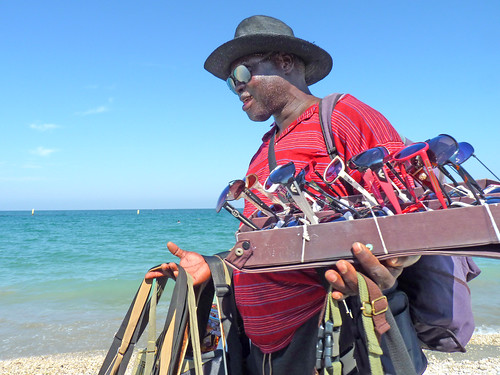
Man selling sunglasses and bags on the beach at Marina Palmense, Italy. There are hundreds of such traders walking the beaches of Italy at the moment. Must be a soul-destroying job, but they keep their chin up.
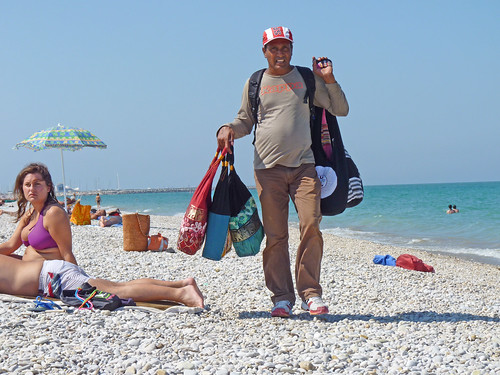
I don’t know from which country or countries the Asian traders originate.
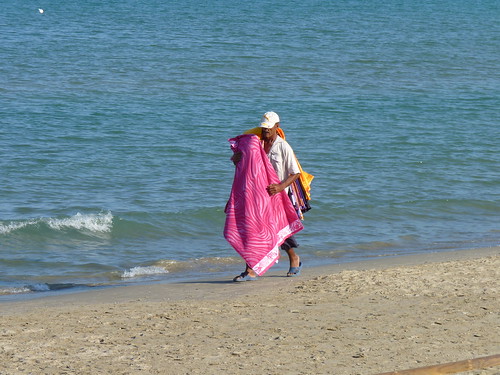
The beach traders who sell towels, almost all of whom are Asian, look quite colourful as they march along with their wares on display.
The number of Africans in particular are mushrooming since the arrangement between Berlusconi and Ghaddafi to stop them from leaving Libya fell apart and the boats to Lampedusa became ever fuller and more numerous. There is a write-up about this, giving some inkling of the exploitation behind it, in a Daily Telegraph article Libya’s lost immigrant souls with nowhere to go. A harrowing article that explains why since August 2011 the influx of boats has stopped. Italian government ministers will be somewhat relieved, though not half as relieved as the Africans who made it before then. I mentioned this to a recently-arrived Nigerian street seller, but he appeared to be unaware just how fortunate he was.
African men also try to sell you things in the car parks of some supermarkets. I have never seen African women doing this, though I have seen them begging in shop carparks.

They get shoo’d away by the staff, but they keep coming back.
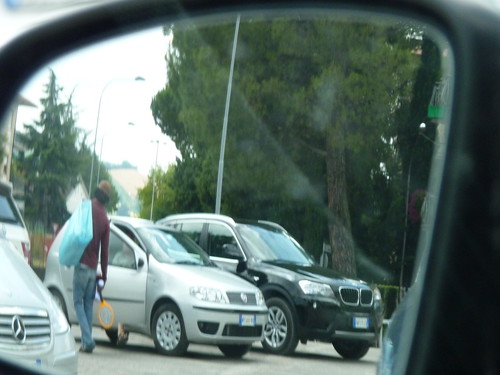
Taken through the door mirror of my car. The trader is hassling someone who is about to drive away, or thought they were. I spoke to the trader, a cheery soul, he spoke natural English and said he came from Nigeria.
The African traders walk for miles, calling on peoples’s doors, trying to sell some cheap rubbish or to get someone to take pity on them and give them a euro. Many of them are extraordinarily cheerful and almost universally polite, and people do take pity on them and give them something, sometimes, though with there being so many . . .
I asked one young Nigerian in September 2011 how long he had been in Italy. Two years he replied. And is it not frustrating walking from village to village trying to flog people trinkets? Eeeh (a Nigerian form of don’t ask awkward questions), but what else can I do? There is no work.
Where do they get these goods from? There must be an organised supply system somewhere, and I think these traders are being exploited, none of them wants to be trying to sell junk to greasy half-naked Europeans, but it’s presumably the only way they can make a little income.
There’s a writeup on where some of these traders may live, and what may be the origin of some of their goods, on Hotel House.
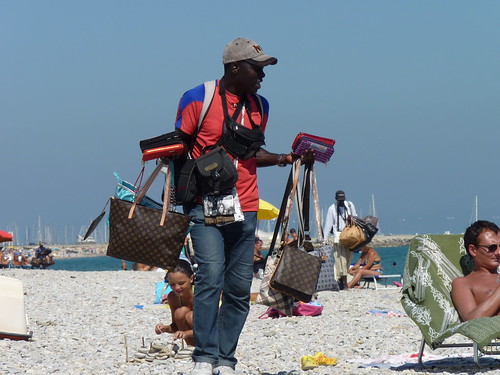
Marina Palmense on the Adriatic coast of Italy. The bags might be counterfeit designer labels, for all I know about it. The source of these bags might be the Camorra – see Hotel House. But then again, in either case, they might not. I wouldn’t know. There are three bag sellers in this picture, and this is typical at certain times of the day on Italian beaches in 2011.
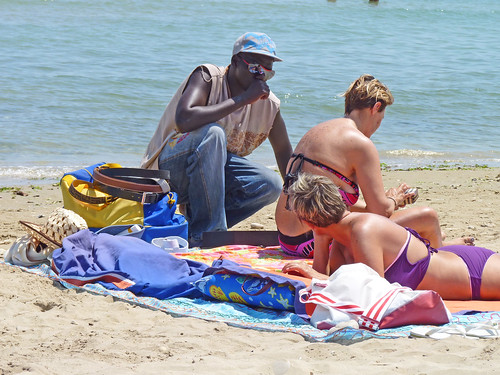
The African beach trader might have a sale. Behind those reflective sunglasses, what’s he thinking? The women have tied the neck strap of their bikini tops behind their back, for the sake of the suntan; this seems to be something of a fashion at the moment. Presumably works alright if they don’t jig up and down too much.
There’s very little about this on the web, or anywhere else for that matter. You can find some pictures by typing ‘vu cumpra’ into Google images. See also my page Vu Cumprà. The Economist did an article on Senegalese street traders in Italy in 2006 and this article helps to explain where many of these traders go in the winter.
In the late afternoon in the seaside-town railway stations and alongside the main roads, you see the traders boarding a train, a bus or waiting for their lift, with their bags of merchandise still unsold, on their way back to wherever it is they are all staying. Someone or some organisation or organisations are controlling all this.
And some of the immigrants work the stations and trains, begging, see Gawd Bless You Guv.
Some of the traders who have clearly been doing this for a while lose their cheerful countenance and replace it was one of frustration and misery.
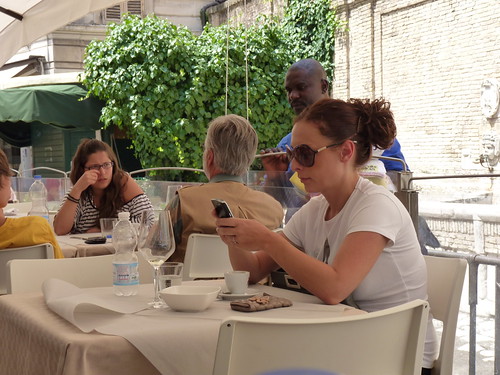
An immigrant trinket-seller is trying to flog his wares at a restaurant in Ancona. People studiously ignore him, except for me, I told him to piss off and don’t interrupt my lunch, which he duly did, with a look of anger and outrage on his face. I subsequently felt bad about this as he is probably desperate to send money back home to whichever country he originated from, in order to help feed and educate his family.
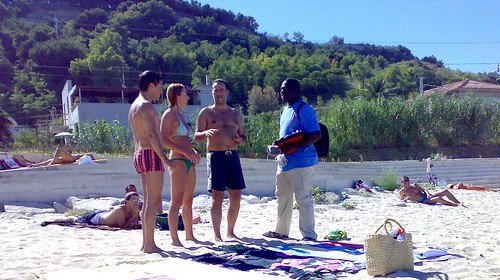
The African beach trader is trying to sell something, some tapes it looks like, to a group of sunbathers at Grottammare, Italy. This beach is no longer there, unfortunately, it has been washed away by the sea. Notice the cigarette in the potential customer’s mouth. Typical. Italian beaches can get to look like a giant ashtray at the end of the summer season. You sometimes see someone who is being sold junk offer the immigrant a cigarette. The immigrant takes it and lights it and goes away smoking it though clearly an entirely unfamiliar experience for him.

The same African, trying his luck some more.
It’s Italy that is awash with such traders. They’ll be booted off the beach in Greece by the tourist police. Not sure how much they exist in France. maybe a bit. And where is it all leading? The prospects don’t seem too good, either for the traders or their host country that is trying to turn and look the other way.
Well, yeah, these traders can be very annoying sometimes, but they really need money. That's a very delicate problem...
ReplyDeleteI wrote about a similar issue, I give you the link to my site. online currency conversion
ReplyDelete